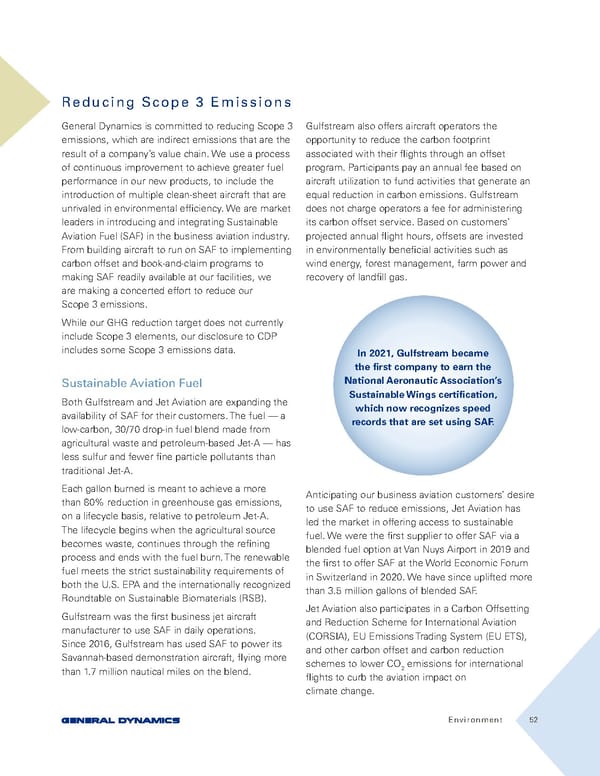Environment 52 Reducing Scope 3 Emissions General Dynamics is committed to reducing Scope 3 emissions, which are indirect emissions that are the result of a company’s value chain. We use a process of continuous improvement to achieve greater fuel performance in our new products, to include the introduction of multiple clean-sheet aircraft that are unrivaled in environmental efficiency. We are market leaders in introducing and integrating Sustainable Aviation Fuel (SAF) in the business aviation industry. From building aircraft to run on SAF to implementing carbon offset and book-and-claim programs to making SAF readily available at our facilities, we are making a concerted effort to reduce our Scope 3 emissions. While our GHG reduction target does not currently include Scope 3 elements, our disclosure to CDP includes some Scope 3 emissions data. Sustainable Aviation Fuel Both Gulfstream and Jet Aviation are expanding the availability of SAF for their customers. The fuel — a low-carbon, 30/70 drop-in fuel blend made from agricultural waste and petroleum-based Jet-A — has less sulfur and fewer fine particle pollutants than traditional Jet-A. Each gallon burned is meant to achieve a more than 80% reduction in greenhouse gas emissions, on a lifecycle basis, relative to petroleum Jet-A. The lifecycle begins when the agricultural source becomes waste, continues through the refining process and ends with the fuel burn. The renewable fuel meets the strict sustainability requirements of both the U.S. EPA and the internationally recognized Roundtable on Sustainable Biomaterials (RSB). Gulfstream was the first business jet aircraft manufacturer to use SAF in daily operations. Since 2016, Gulfstream has used SAF to power its Savannah-based demonstration aircraft, flying more than 1.7 million nautical miles on the blend. Gulfstream also offers aircraft operators the opportunity to reduce the carbon footprint associated with their flights through an offset program. Participants pay an annual fee based on aircraft utilization to fund activities that generate an equal reduction in carbon emissions. Gulfstream does not charge operators a fee for administering its carbon offset service. Based on customers’ projected annual flight hours, offsets are invested in environmentally beneficial activities such as wind energy, forest management, farm power and recovery of landfill gas. Anticipating our business aviation customers’ desire to use SAF to reduce emissions, Jet Aviation has led the market in offering access to sustainable fuel. We were the first supplier to offer SAF via a blended fuel option at Van Nuys Airport in 2019 and the first to offer SAF at the World Economic Forum in Switzerland in 2020. We have since uplifted more than 3.5 million gallons of blended SAF. Jet Aviation also participates in a Carbon Offsetting and Reduction Scheme for International Aviation (CORSIA), EU Emissions Trading System (EU ETS), and other carbon offset and carbon reduction schemes to lower CO 2 emissions for international flights to curb the aviation impact on climate change. In 2021, Gulfstream became the first company to earn the National Aeronautic Association’s Sustainable Wings certification, which now recognizes speed records that are set using SAF.
 General Dynamics Sustainability Report Page 51 Page 53
General Dynamics Sustainability Report Page 51 Page 53